Do Banana Skins Keep Slugs Away? Discover the Surprising Truth!
Slugs can be a real nuisance in your garden, munching away at your plants and leaving behind a slimy trail. You might have heard that using banana skins can help keep these pests away. Placing banana skins near affected plants can attract slugs, but this doesn’t actually repel them; instead, it acts as a trap.
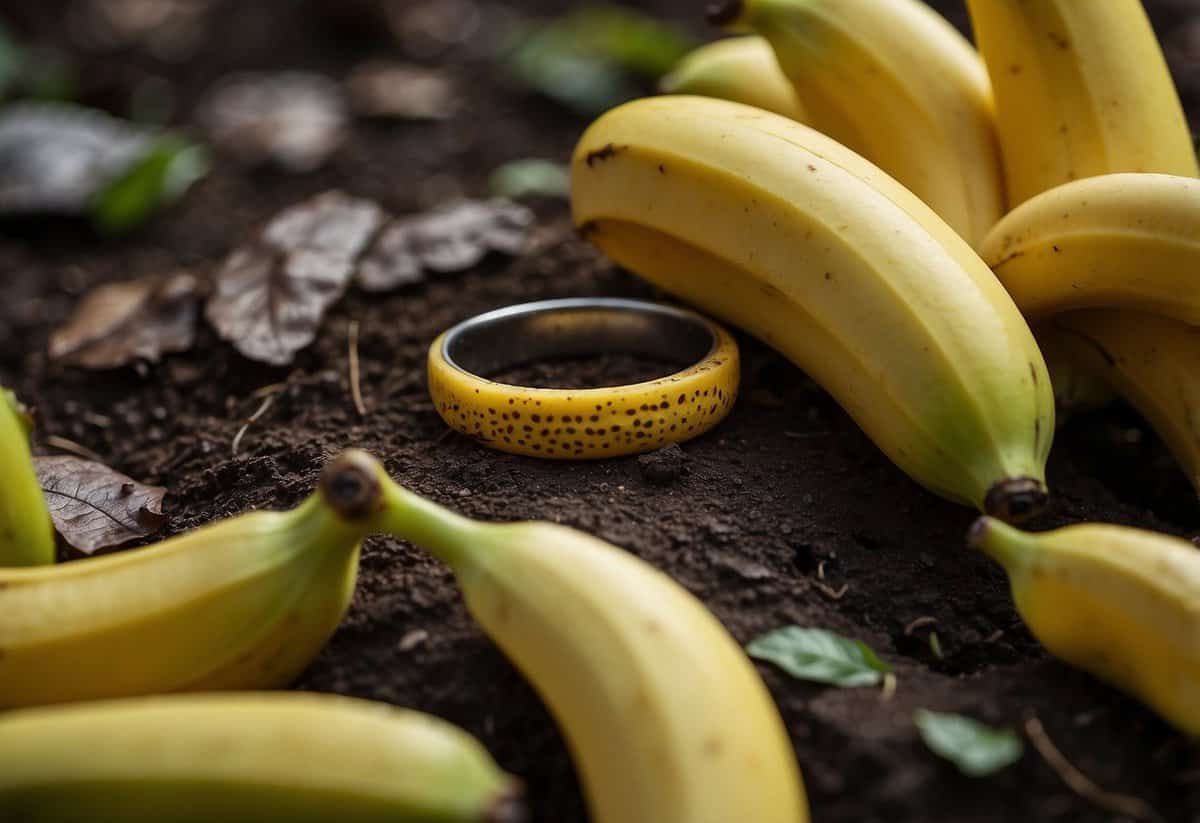
When you place banana skins around your garden, the slugs are drawn to the peel rather than your precious plants. In the morning, you simply gather the banana skins with slugs attached and dispose of them. This method is an easy and natural way to deal with slugs without using harmful chemicals.
Using natural remedies like banana skins makes gardening safer for you and the environment. Next time you enjoy a banana, consider saving the peel to help protect your plants from these slimy invaders.
Understanding Slugs in the Garden
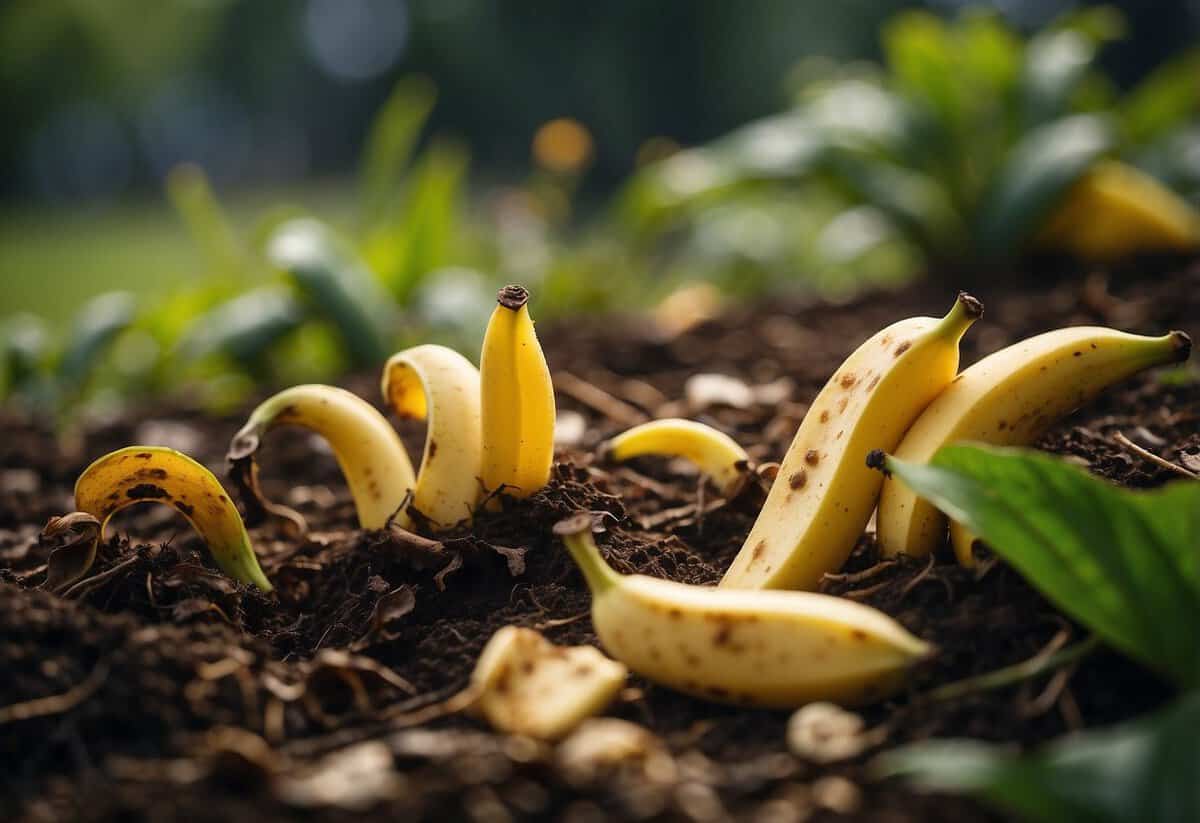
Slugs are common garden pests that can cause significant damage to your plants. These creatures have specific habits and habitats that make them formidable nuisances, but understanding them can help you manage their impact.
Slug Habitat and Behavior
Slugs thrive in damp, cool environments. They are often found in moist soil, under rocks, and in shady areas of your garden. These nocturnal creatures are most active during the night or on cloudy days, avoiding the sun to keep from drying out.
Slugs also tend to hide under mulch, leaves, and other debris, so keeping your garden tidy can reduce their hiding spots. They can be as small as a few millimeters or grow up to several inches, like the banana slug. Understanding their habitat and behavior is key to finding effective ways to control them.
The Impact of Slugs on Plants
Slugs can cause severe damage to your plants by chewing holes in leaves, stems, and even fruits. They particularly love young and tender plants, making seedlings and new growth vulnerable to infestation. They consume organic matter, which is normally beneficial for soil health, but in large numbers, slugs can devastate your garden.
Their feeding habits not only damage plants but also make them less attractive and can introduce diseases. Using barriers such as copper tape or crushed eggshells can help protect your plants from these pests. Recognizing the signs of slug damage early can help you take action and protect your garden.
Traditional Slug Prevention and Control
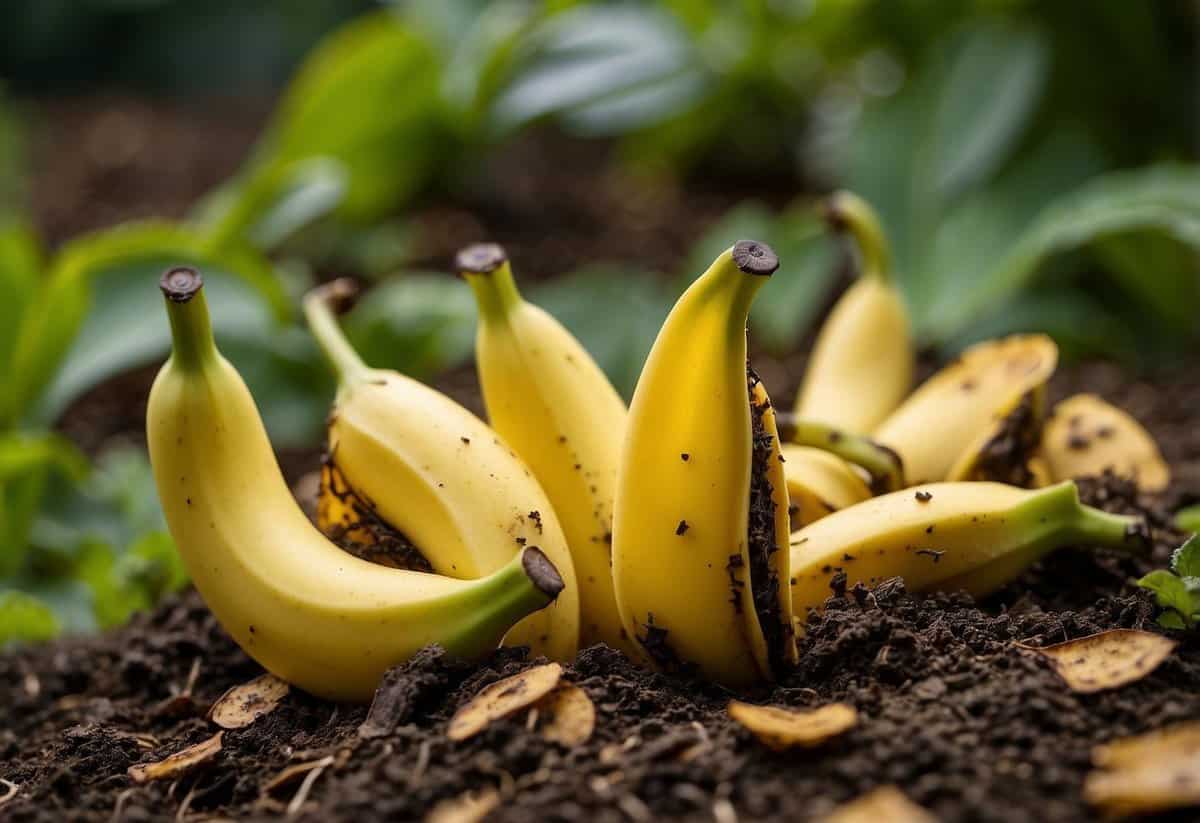
Slugs are a common garden pest, and keeping them away can be challenging. This section covers various methods such as natural deterrents, chemicals, and barriers like beer traps and copper tape.
Common Methods Used by Gardeners
To keep slugs at bay, gardeners often turn to simple methods. One way is manual collection, where you gather slugs by hand, usually at night or early morning when they are active. Another useful method is using mulch, which creates a rough surface that slugs dislike.
Some gardeners also use barriers like inverted watermelon rinds or creating distractions with old fruits. These methods are effective but require regular maintenance and vigilance.
Chemicals Versus Natural Methods
When dealing with slugs, you can choose between chemical solutions and natural methods. Chemical options include slug pellets containing substances like metaldehyde. These are effective but can harm pets and other wildlife. Some gardeners avoid using them due to potential environmental impacts.
Natural methods, like using drip irrigation, minimize the damp conditions that slugs love. Planting slug-resistant plants or using organic deterrents like coffee grounds can help. These methods are safer for your garden’s ecosystem and reduce the need for toxic chemicals.
Beer Traps and Copper Barriers
Beer traps are a popular and eco-friendly way to control slugs. You can set up shallow containers filled with beer. Slugs are attracted to the beer, fall in, and drown. It’s a method that needs regular checking and refilling but is very effective.
Copper tape is another option. Slugs avoid crossing copper due to a reaction it creates with their slime, giving them a mild electric shock. You can place copper barriers around plants or garden beds for protection. These barriers are long-lasting and provide an ongoing solution against slugs.
By using a mix of these traditional methods, you can effectively manage and reduce the slug population in your garden, ensuring healthier plants and a more enjoyable gardening experience.
Natural Remedies and Barriers

When trying to keep slugs away from your garden, you can use several natural methods and barriers. These options are easy to implement and help protect your plants in an eco-friendly way.
Utilizing Eggshells and Coffee Grounds
Scattering eggshells and coffee grounds around your plants can help deter slugs. The sharp edges of broken eggshells make it uncomfortable for slugs to crawl over them. Additionally, eggshells decompose and enrich the soil with calcium. Coffee grounds are another great option. Slugs dislike the bitter taste and gritty texture, which keeps them away.
To use these methods, simply crush eggshells and sprinkle them around the base of your plants. For coffee grounds, spread them in a thin layer around your garden. Both materials are organic and won’t harm your plants.
The Role of Predators and Wildlife
Encouraging natural predators in your garden can help reduce the slug population. Ground beetles, birds, hedgehogs, frogs, and toads are all beneficial species that feed on slugs. By creating a welcoming environment for these animals, you can help keep slug numbers in check.
To attract these predators, provide hiding spots like small piles of rocks or logs. Plant flowers and herbs that attract insects like ground beetles. Install birdhouses and bird feeders to invite birds into your garden. Make sure your garden has a water source like a small pond or a shallow dish to attract frogs and toads.
Organic Materials as Protective Barriers
Using organic matter as a protective barrier can help keep slugs away from your plants. Crushed nutshells, sharp sand, and pine needles are examples of materials that create an uncomfortable surface for slugs. These barriers can be placed in circles around plants that slugs tend to target.
To implement this, create a ring of the chosen material around the plants you want to protect. This barrier not only deters slugs but also helps retain soil moisture and can improve soil health over time.
The Science Behind Banana Skins and Slugs
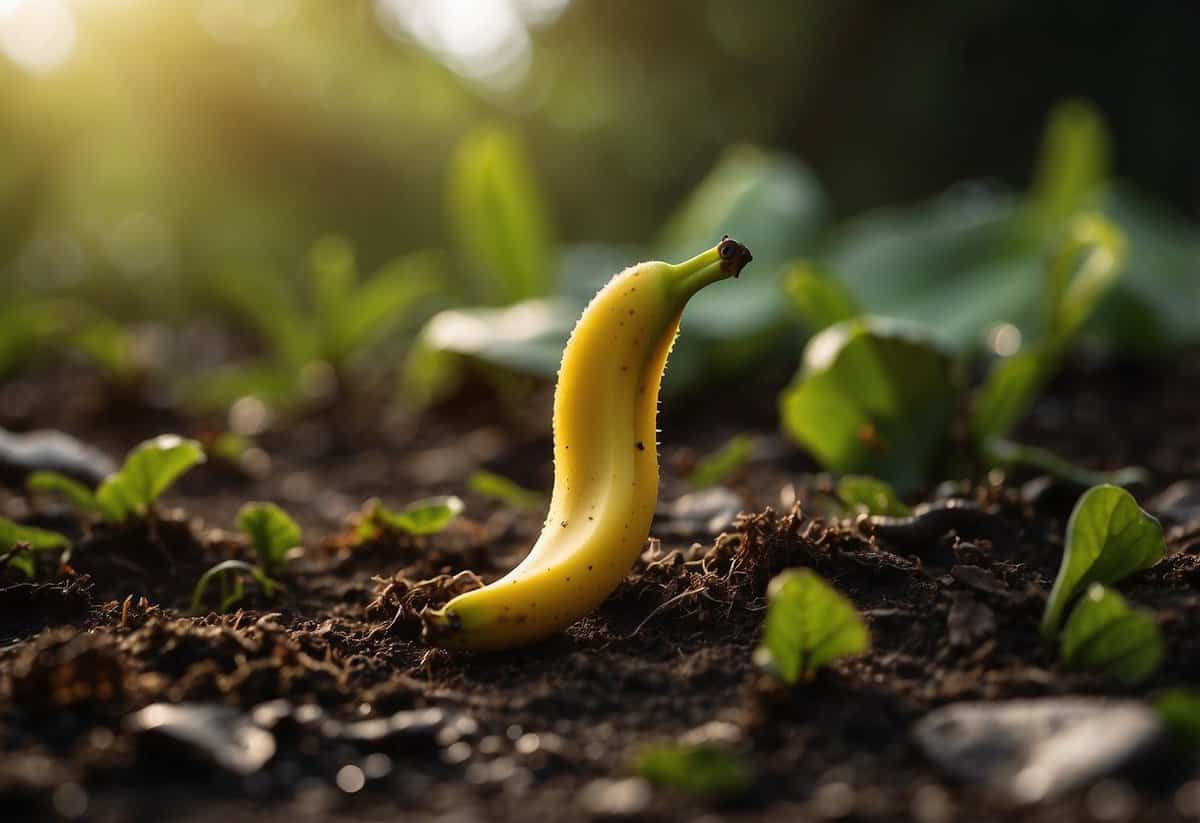
Banana skins have been rumored to repel slugs, but what does the science actually say? This section covers how nutrients in banana skins might affect slugs and separates the myths from scientific evidence.
Nutrient Effects and Slug Deterrence
Banana skins are rich in nutrients like potassium and phosphate. These nutrients can nourish plants, but there is no clear evidence that they effectively deter slugs.
Slugs are known to eat organic material, so placing banana skins in your garden might actually attract more slugs instead of repelling them. The moisture from the skins might also create a hospitable environment for slugs.
However, if applied properly, the skins might help in other ways. Nutrients from decomposing banana skins can enrich soil and boost plant health, potentially making your garden less appealing to pests over time. Be cautious, because this isn’t a surefire slug deterrent.
Myths versus Scientific Evidence
There’s a widespread myth that banana skins can keep slugs away simply by their presence. Science does not support this claim. While banana skins are useful as organic compost, they don’t act as a direct deterrent for slugs.
In some cases, banana skins can attract slugs. The idea that slugs dislike the texture or smell of banana skins has no solid foundation in research. Instead, most gardeners find no significant difference when using banana skins for slug control.
To effectively control slugs, it’s better to use proven methods like copper barriers or slug pellets. Relying solely on banana skins may not give you the results you’re looking for.
For more detailed insights on banana slugs, you can read about the Banana Slug: All You Need to Know. You might also find it interesting to learn about the Secret of the Slime used by these creatures.
Incorporating Companion Plants for Slug Management
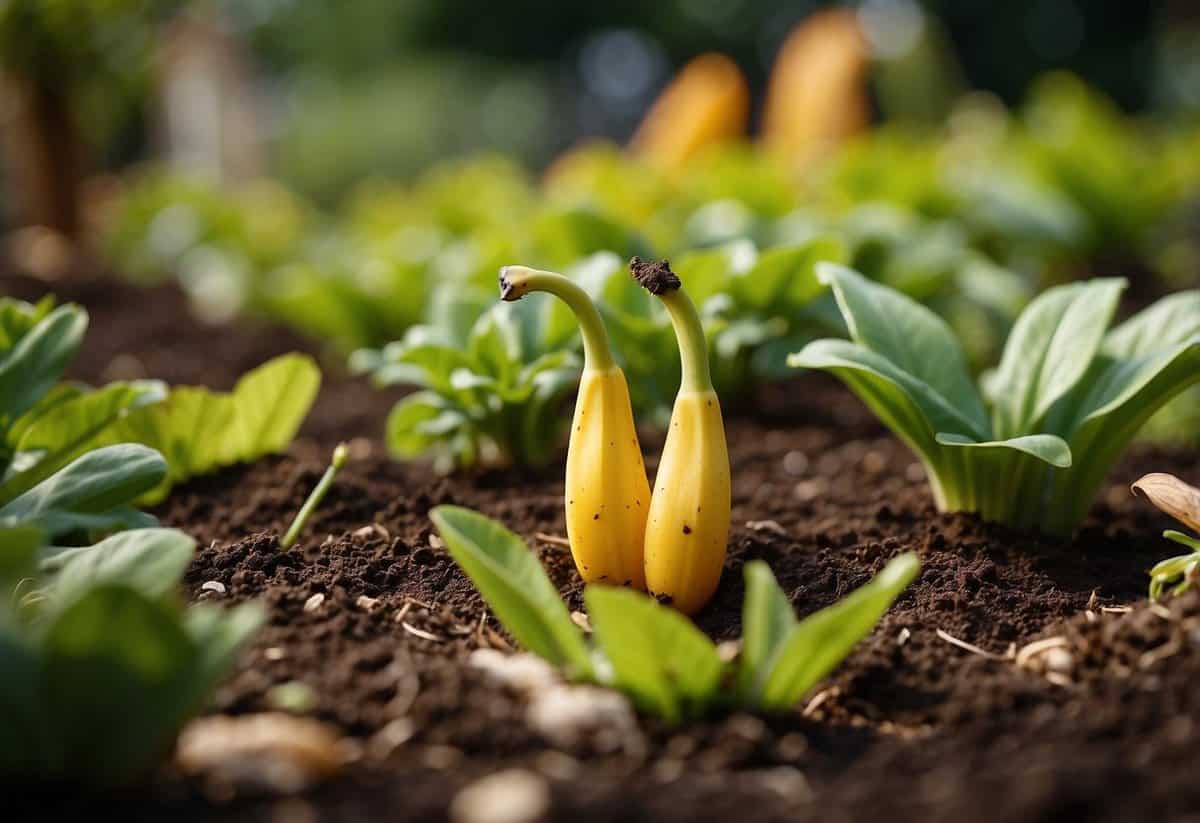
Using companion plants can be highly effective in reducing slug problems in your garden. Certain plants are known to repel slugs or attract natural predators that keep slug populations in check.
Selecting the Right Plants
Choosing the right plants is crucial. Lavender, for instance, has strong aromas that slugs tend to avoid. Another good option is rosemary, which works similarly. Sage is also effective due to its fragrant leaves.
Slugs dislike plants with tough, thorny, or hairy textures. Ferns and yucca are often left alone by these pests due to their unpalatable nature. Marigolds may require protection, as slugs are attracted to their tender leaves.
Use the table below to quickly decide which plants to incorporate:
| Plant | Effect on Slugs |
|---|---|
| Lavender | Repellent |
| Rosemary | Repellent |
| Sage | Repellent |
| Ferns | Unpalatable |
| Yucca | Unpalatable |
Companion Planting Benefits
Companion planting offers more than just slug control. It can improve the health and growth of your plants. For example, lavender and rosemary not only repel slugs, but their roots can improve soil conditions.
This type of gardening also attracts beneficial insects. Planting flowers like marigolds can draw in insects that prey on slugs, providing a natural pest control method.
By integrating these plants into your garden, you’ll create a healthier and more balanced ecosystem. This reduces the need for chemical slug deterrents and fosters a more sustainable gardening approach.







